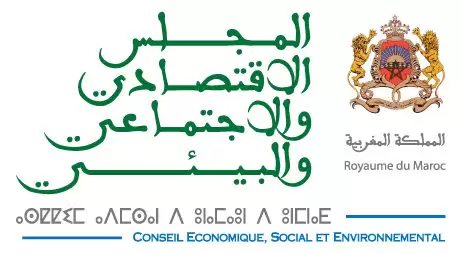
This opinion follows through on a recommendation by the CESE in a previous own-initiative opinion (2021) titled “Towards a responsible and inclusive digital transformation” wherein it was emphasized that artificial intelligence (AI) should be elevated as a priority in Morocco’s push for digital transformation. The present opinion therefore highlights the multiple factors influencing the establishment and implementation of the AI management system in the country. It also explores what areas in our lives and businesses the AI is integrated into and the prospects of AI development in Morocco. This opinion was unanimously adopted by the 159th regular General Assembly session of 27 June 2024.
This opinion follows through on a recommendation by the CESE in a previous own-initiative opinion (2021) titled “Towards a responsible and inclusive digital transformation” wherein it was emphasized that artificial intelligence (AI) should be elevated as a priority in Morocco’s push for digital transformation. The present opinion therefore highlights the multiple factors influencing the establishment and implementation of the AI management system in the country. It also explores what areas in our lives and businesses the AI is integrated into and the prospects of AI development in Morocco. This opinion was unanimously adopted by the 159th regular General Assembly session of 27 June 2024.
Artificial intelligence (AI) is central to the dynamics of digital transformation, both in its specific applications across all productive sectors and in the various layers of impact it has on the economy and society. Advancements in artificial intelligence technology, particularly with the advent of generative AI, have positioned AI not only as a catalyst for economic growth, but also as a major lever to improve essential services like health care and education, making them more accessible to everyone, efficient and personalized. This is all the more so as substantiated studies estimate that the take-up of AI may increase global GDP by up to 14% by 2030. There is also documented evidence of the potential of AI acting as an enabler on 79% of the SDGs by 2030.
However, the introduction of AI presents countless major challenges. Viewing it from an ethical lens, AI can pose considerable privacy risks inherent to the massive treatment of collected personal data. Further, AI-based algorithms might sometimes repeatedly produce biased outputs, thus leading to unfair and discriminatory outcomes in decision-making processes. On a social level, the integration of artificial intelligence (AI) impacts employment patterns, with concerns about job transformations and losses.
Indeed, Morocco is well placed to better position itself regarding AI, with its arsenal of laws and regulations governing key aspects of digital technology, such as relates to cybersecurity and consumer cyber protection. Morocco’s commitment to provide thrust and impetus to artificial intelligence in the country is manifest in creative initiatives such as the establishment at Mohammed VI Polytechnic University (UM6P) of the International Center for Artificial
Intelligence of Morocco (named “AI movement” center) and the “Al Khawarizmi” call for digital projects in the fields of artificial intelligence and big data, along with other similar steps led by engineering schools and certain ministerial departments. On an international scale, Morocco is actively committed to ethical and responsible AI development and deployment, being one of the first countries to align itself with UNESCO’s “Recommendation on the Ethics of Artificial Intelligence” and having co-sponsored a UN resolution on AI for sustainable development.
However, a number of obstacles stand in the way of Morocco’s embrace of AI, most substantial of which is said to be the lack of a specific regulation of artificial intelligence in Moroccan law and the slow public release of data. In addition, AI startups are already facing difficulties in securing funding, with eligibility requirements often ill-suited to their specific needs. The obvious AI skills gap and lack of qualified AI specialists is also obstructing the design of a high-performance AI ecosystem. Moreover and notwithstanding isolated R&D initiatives, the lack of synergy and mismatch between projects and industrial needs, in the absence of a clear and coherent national vision, is mortgaging the implementation of AI solutions that align with the economic priorities of Morocco.
Based on this assessment, the CESE calls for a national AI strategy associated with the country’s ambitions. The primary goal is to boost AI ecosystem in Morocco, by spurring widespread use of AI technologies nationwide. The purpose is also to provide a better environment to help grow Morocco’s AI industry by 2030, through encouraging the creation and growth of AI-driven startups and innovative AI initiatives, with the support of national and international investment. This ecosystem shall help develop potentially exportable AI products and services, while promoting the ethical and responsible use of AI across all sectors.
To this end, the CESE has developed a set of recommendations, including:
– Review the Moroccan Personal Data Protection Act (No. 09-08) to align it with the requirements around the data produced and handled by AI systems, while ensuring that it complies with international standards.
– Promote the reasoned use of AI tools in all sectors, both public and private, by developing a support plan specifically designed for small and medium-size enterprises (SMEs) and very small enterprises (VSEs), with as primary components the initial training and necessary arrangements to facilitate access to financial, hardware and software resources.
– Secure free access to public data and provide reliable, interoperable data to unlock information to feed AI applications.
– Create a public-private investment fund to promote innovation in AI and advanced digital technologies, such as through grants aimed at providing seed funding and venture capital to aid AI startup projects grow further.
– Offer tax incentives for businesses of all sizes, particularly VSEs and SMEs, that either leverage artificial intelligence to enhance productivity or collaborate with the AI research industry. It is also necessary here to adapt the Investment Charter to best respond to the specificities of AI-driven startups, by reviewing the current eligibility criteria for investors.
– Prioritize efforts to activate AI-powered solutions in no more than two or three sectors (such as education, healthcare and agriculture) to keep distractions at bay.
– Develop a sovereign data language (Darija, the Moroccan colloquial Arabic) to promote digital inclusion of all citizens regardless of their education level and to thereby make AI accessible across the Kingdom.
– Integrate AI systematically into national education and training curricula and upgrade higher education programs in AI at universities and specialized colleges. Equally important is the need to address the shortage of trainers with AI expertise, through such measures as offering training-of-trainers courses in artificial intelligence to people with scientific backgrounds like mathematicians.
